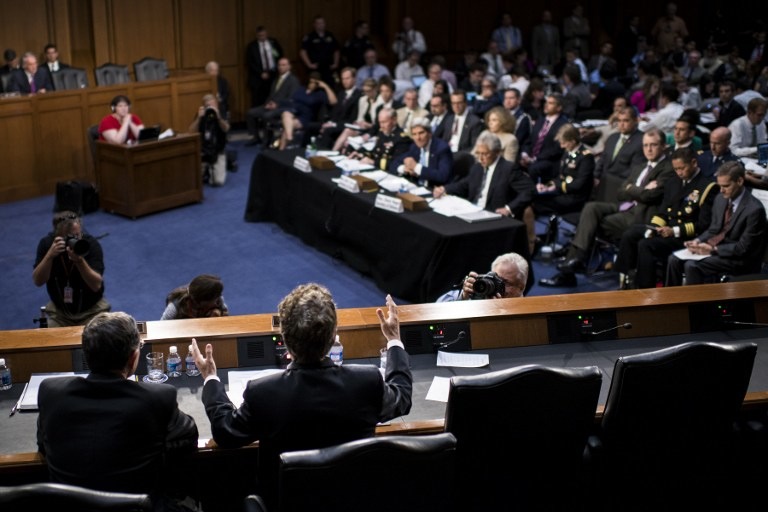SUMMARY
This is AI generated summarization, which may have errors. For context, always refer to the full article.

WASHINGTON DC, USA – US President Barack Obama’s plan to conduct military strikes on Syria passed its first congressional hurdle Wednesday, September 4, paving the way for a full Senate debate on the use of force.
A divided Senate Foreign Relations Committee approved an amended resolution 10-7, that would authorize US military intervention with a 90-day deadline and bars American boots on the ground for combat purposes.
The Senate’s newest member, Democrat Edward Markey, voted present.
Senate leaders have said the full chamber will debate and vote next week on authorization of the use of force in response to Syrian President Bashar al-Assad’s apparent use of chemical weapons against his own people.
The House of Representatives, where a tougher vote is expected, will begin consideration next week but its leaders have not announced timing of a vote.
“What we’ve done today is a step in the right direction,” said Senator Dick Durbin.
The chamber’s number two Democrat voted against the Iraq war, but he insisted that “this is different.”
“I really believe there is a moral component here that’s critically important,” he said, citing how all members of the committee are horrified by the attacks by Assad.
Senator Robert Menendez, the committee’s chairman, said the resolution marks “a good foundation” for passing the Senate.
“This resolution strikes the type of balance that we are hearing from members on both sides of the aisle in both houses as to what their concerns are.”
Work continues
The White House commended the panel for “moving swiftly” to approve the measure.
“We will continue to work with Congress to build on this bipartisan support for a military response that is narrowly tailored to enforce the prohibition on the use of chemical weapons, and sufficient to protect (US) national security interests,” the White House said.
Obama’s administration had offered a draft text, but the committee’s leaders re-worked it to set a time limit of 60 days plus a 30-day extension, and banned the use of any US ground troops in Syria to accomplish the mission.
But deep divisions emerged over the scope of the military action, and Republicans and Democrats voted in favor of the measure as well as against it.
Earlier in the day the committee held a three-hour classified session, with Secretary of State John Kerry selling the case to members before testifying at a panel of the House of Representatives, where lawmakers and analysts foresee a tough fight over giving Obama authority to strike.
“We need to send to Syria — and to the world, to dictators and terrorists, to allies and civilians alike — the unmistakable message that when we say ‘never again,’ we actually don’t mean sometimes, we don’t mean somewhere, we mean never again,” Kerry told the House Foreign Affairs Committee.
The Senate text was modified to include language sought by Republican Senator John McCain, who had threatened a no vote unless the measure was toughened up.
The committee debated and ultimately approved his amendment, which declared it is “the policy of the United States to change the momentum on the battlefield in Syria,” and urges a comprehensive US strategy boost the fighting capabilities of “elements of the Syrian opposition.”
McCain voted yes but five fellow Republicans, including potential 2016 presidential candidates Rand Paul and Marco Rubio, voted against.
Paul, who unsuccessfully sought to limit the power of the president to “unilaterally authorize a military attack” where there is no imminent threat, said he was unconvinced that Obama’s plan would achieve its goals.
“I frankly think that bombing Syria increases the likelihood of additional gas attacks, may increase attacks on Israel and Turkey, may increase civilian deaths, may increase instability in the Middle East and may draw Russia and Iran further into this civil war,” he said.
Senate Democrat Tom Udall, an opponent of military intervention, introduced an amendment that would have narrowed Obama’s military options as the lawmaker sought to prevent greater US involvement.
The Udall amendment, which McCain dismissed as “micromanagement,” was defeated. – Rappler.com
Add a comment
How does this make you feel?
There are no comments yet. Add your comment to start the conversation.